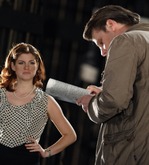SITE GUIDE
SEARCH
REVIEWS
REVIEW ARCHIVES
ADVERTISING AT CURTAINUP
FEATURES
NEWS
Etcetera and
Short Term Listings
LISTINGS
Broadway
Off-Broadway
NYC Restaurants
BOOKS and CDs
OTHER PLACES
Berkshires
London
California
New Jersey
DC
Connecticut
Philadelphia
Elsewhere
QUOTES
TKTS
PLAYWRIGHTS' ALBUMS
LETTERS TO EDITOR
FILM
LINKS
MISCELLANEOUS
Free Updates
Masthead
Writing for Us
A CurtainUp  London Review
London Review
 London Review
London ReviewThe Power of Yes
|
The bankers arenít the villains just the hamsters on the wheel.— Howard Davies, First Chair of the Financial Services Authority
|

Jemima Rooper as Masa Serdarevic and Anthony Calf as the Author (Photo: Catherine Ashmore) |
The Power of Yes is informative and didactic but there is no drama other than the events themselves and there is really no reason why these facts have to be presented by actors rather than in the form of a long newspaper article, a book or a television documentary. If you go to the theatre looking for a play with characters and staging you will be disappointed. It is particularly unfortunate for Hare that, on a similar subject, Lucy Prebbleís play Enronwith its inventive staging is showing in London contemporaneously with the dismal Power of Yes. It also begs the question, "Do we want economics explained to us by a playwright rather than by a financial journalist like the BBCís Robert Peston?"
Jemina Rooper is enlisted to play Masa Serdarevic, an Oxford graduate who was photographed leaving Lehman Brothers in Canary Wharf last year with her cardboard box of office possessions. She now works for The Financial Times. She introducers many of the other bankers and financiers who come onstage to say their bit. The detail that Hare got wrong and I know because I was in Canary Wharf that day, was that they didnít come in to work in their suits, but were defiantly wearing trainers and jeans and sports kit, the way city workers tell you they are on their time and not the firmís. Serdarevicís role is to guide the playwright through the minefields of subprime lending and hedge funds. As we observed in the plays about Afghanistan at The Tricycle, Rooperís Easter European accent is not yet one of her strengths.
Malcolm Sinclair plays the American academic Myron Scholes who we are told is "the intellectual father of the credit default swap". No one plays Alan Greenspan, instead three screens project video footage of his mouth, the view restricted from the bottom of his glasses to his chin. Why Greenspan has to be almost disembodied is because, with his devotion to the anti-Communist Ayn Rand, he is the nearest Hareís play gets to a villain.
The Power of Yes is well researched but there it stops. Looking at the oeuvre of Hareís work I can see there have been some plays light on plot. The Power of Yes is full of the stuff of plot but devoid of theatre.
|
Subscribe to our FREE email updates with a note from editor Elyse Sommer about additions to the website -- with main page hot links to the latest features posted at our numerous locations. To subscribe,
E-mail: esommer@curtainup.comesommer@curtainup.com
put SUBSCRIBE CURTAINUP EMAIL UPDATE in the subject line and your full name and email address in the body of the message -- if you can spare a minute, tell us how you came to CurtainUp and from what part of the country. |
| The Power of Yes
Written by David Hare Directed by Angus Jackson With: Julien Ball, Ian Bartholomew, Anthony Calf, Richard Cordery, Jonathan Coy, Mark Elstob, Paul Freeman, Ian Gelder, John Hollingworth, Bruce Myers, Claire Price, Jeff Rawle, Christian Roe, Jemima Rooper, Malcolm Sinclair, Peter Sullivan, Nicolas Tennant, Alan Vicary, Simon Williams, Lizzie Winkler Design: Bob Crowley Lighting: Paule Constable Music : Stephen Warbeck Sound: John Leonard Video Design: John Driscoll with Gemma Carrington Running time: One hour 45 minutes with no interval Box Office: 020 7452 3000 Booking to 10th January 2009 Reviewed by Lizzie Loveridge based on 14th October 2009 performance at the Lyttelton Theatre, National Theatre, South Bank, London SE1 (Rail/Tube: Waterloo) |
|
REVIEW FEEDBACK Highlight one of the responses below and click "copy" or"CTRL+C"
Paste the highlighted text into the subject line (CTRL+ V): Feel free to add detailed comments in the body of the email . . . also the names and emails of any friends to whom you'd like us to forward a copy of this review. |
|
London Theatre Tickets Lion King Tickets Billy Elliot Tickets Mighty Boosh Tickets Mamma Mia Tickets We Will Rock You Tickets Theatre Tickets |




